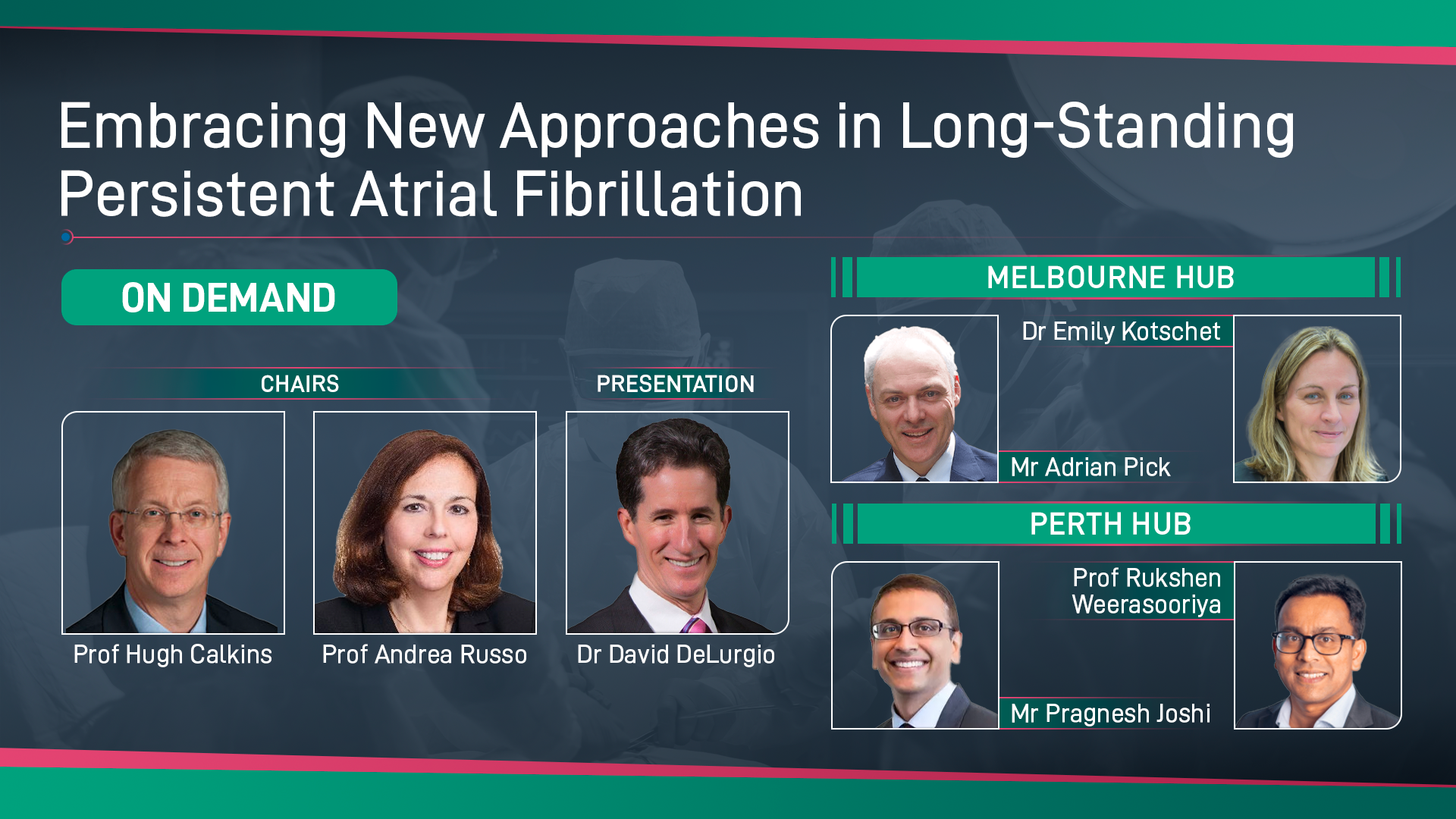Embracing New Approaches in Long-Standing Persistent Atrial Fibrillation
Published: 04 August 2022
-
Views:
 843
843
-
Likes:
 7
7
-
Views:
 843
843
-
Likes:
 7
7
-
 12m 32sPart 4 Panel Discussion
12m 32sPart 4 Panel Discussion
-
 23m 53sPart 5 Adopting a Hybrid Approach
23m 53sPart 5 Adopting a Hybrid Approach
-
 3m 59sPart 1 Welcome and Introductions Andrea Russo, Hugh Calkins, David DeLurgio, Rukshen Weerasooriya, Pragnesh Joshi, Emily Kotschet, Adrian Pick
3m 59sPart 1 Welcome and Introductions Andrea Russo, Hugh Calkins, David DeLurgio, Rukshen Weerasooriya, Pragnesh Joshi, Emily Kotschet, Adrian Pick
Overview
This on-demand version of the live broadcast aims to highlight the benefits of a hybrid management approach for minimally invasive procedures.
In non-paroxysmal atrial fibrillation (AF), where modification of the atrial arrhythmogenic substrate is required, catheter-based ablation using a transvenous, endocardial approach is commonly used but there is growing evidence for a hybrid approach to improve patient outcomes. Research suggests that an integrated approach involving both electrophysiologists and surgeons can lead to improved success rates and increased patient satisfaction compared with a catheter-only approach.
Whilst relatively new, hybrid AF ablation counts some of the world’s leading surgeons and electrophysiologists amongst its advocates. This expert-led broadcast is aimed at increasing awareness of the approach and helping physicians to adopt it in their daily practice, thanks to a series of practically-focussed presentations and discussions from some of the world’s leading experts.
Note, the live version of this session was CME accredited; this on-demand version is not.
Key Learning Objectives
- Define the key team members essential for the adoption of the convergent procedure
- Recall the scientific evidence supporting the safety and efficacy of hybrid ablation techniques in persistent AF
- Identify clinical and anatomical features that make patients good candidates for whom the convergent procedure
- Describe the role of electrophysiologist and surgeon in hybrid approaches
- Compare the overall approach to hybrid ablation with other approaches such as Mini Maze
- Identify local barriers preventing the uptake of hybrid ablation approaches
Target Audience
- Electrophysiologists (EPs)
- Cardiothoracic Surgeons
- Interventional and General Cardiologists
- Other referrers to EPs
More from this programme
Part 1
Welcome and Introductions
| 1 session | |
| Welcome and Introductions | Watch now |
Part 2
Catheter, Surgical, and Hybrid AF Ablation: How Did We Get Here?
Part 3
The Data Behind Hybrid Ablation
| 1 session | |
| The Data Behind Hybrid Ablation | Watch now |
Part 4
Panel Discussion
| 1 session | |
| Panel Discussion | Watch now |
Part 5
Adopting a Hybrid Approach
| 1 session | |
| Adopting a Hybrid Approach | Watch now |
Part 6
Minimally Invasive Approaches for Long-Standing Persistent Atrial Fibrillation: Building a Successful Practice
Part 7
The Future of Hybrid Surgical Ablation: Panel Discussion
Faculty Biographies

Hugh Calkins
Professor of Medicine and Director of Electrophysiology
Dr Hugh Calkins is Professor of Medicine and Director of Electrophysiology at the Johns Hopkins Medical Institution in Baltimore, US.
He has clinical and research interests in the treatment of cardiac arrhythmias with catheter ablation, the role of device therapy for treating ventricular arrhythmias, the evaluation and management of syncope and the study of arrhythmogenic right ventricular dysplasia. He has certifications from the American Board of Internal Medicine in Cardiovascular Disease (1989), Clinical Cardiac Electrophysiology (1992) and Internal Medicine (1986).
Dr Calkins has over 38 years of experience in the medical field. He is an Associate Editor of the Journal of Cardiovascular Electrophysiology and is on the editorial board of several prestigious publications including The Journal of the American College of Cardiology; HeartRhythm and Circulation: Arrhythmia and Electrophysiology. He is a former member of the American Board…





